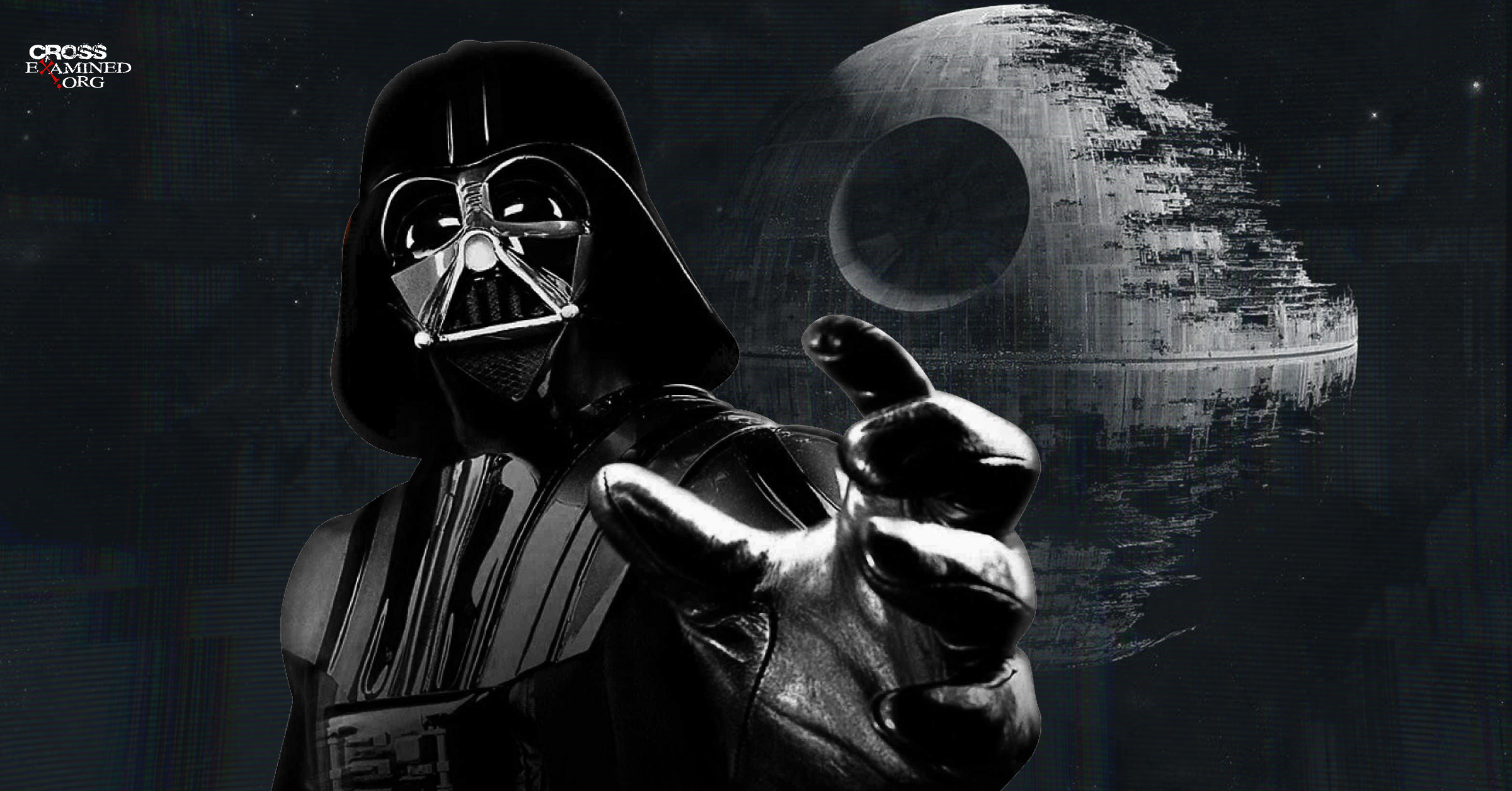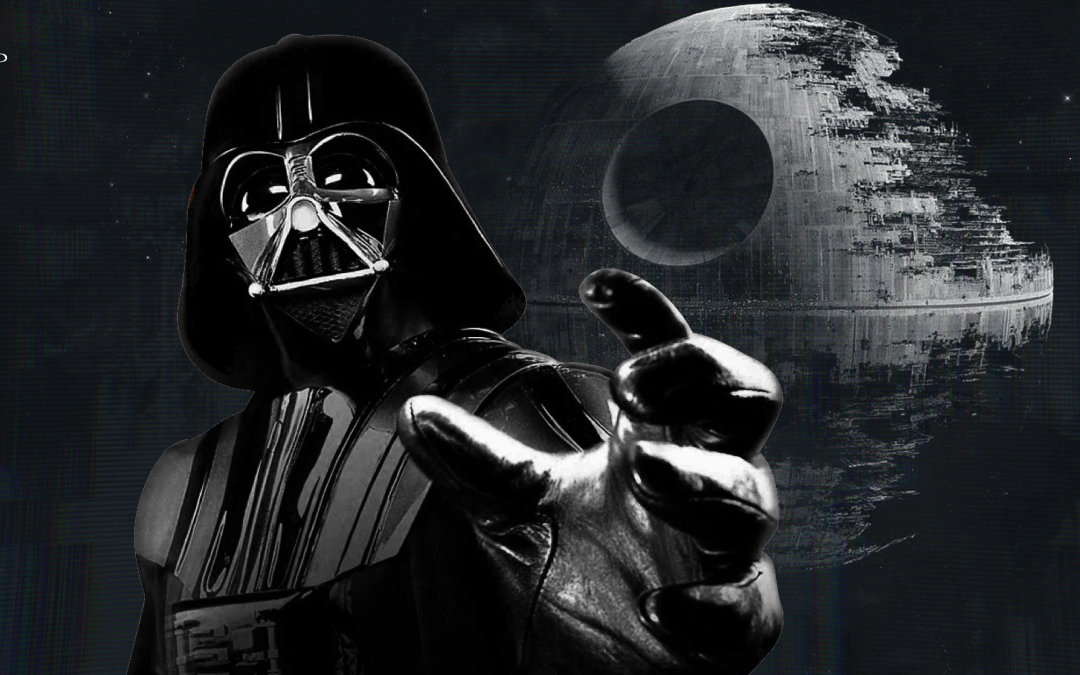By Frank Turek and Frank Zachary Turek
The Star Wars series comprises eleven wonderful movies (some more wonderful than others) that, by design, are infused with overtly religious issues.

George Lucas said, “I put the Force into the movies in order to try to awaken a certain kind of spirituality in young people — more a belief in God than a belief in any particular religious system.”
He admits that he wants to get young people to at least think about the big questions in life: “Is there a God? What does God look like? What does God sound like? What does God feel like? How do we relate to God? Just getting young people to think at that level is what I’ve been trying to do in the films.”
Not bad for Hollywood! But what kind of answers do the movies provide to viewers, and how do they compare to Christianity?
Lucas claims he’s not trying to direct viewers to definite answers. “What eventual manifestation that takes place in terms of how they describe their God, what form their faith takes, is not the point of the movie.”[1]
Of course, it was unavoidable that his movie would depict a specific kind of worldview with its own view of god. The Force isn’t a Christian view of God. The god of Star Wars is closest to the god of pantheism — it is omnipresent and binds the universe together, but the Force makes no moral demands on its users.
Moral demands are, of course, part of Christianity, which often uses the same light-versus-darkness language found in Star Wars. God calls us to be in the light, as He is (1 John 1:7). Those who are in sin are depicted as being in darkness, while those who have accepted Christ as their Savior are in the light of the Lord. In his letter to the Ephesians, Paul writes:
“For you were once darkness, but now you are light in the Lord. Live as children of light (for the fruit of the light consists in all goodness, righteousness, and truth) and find out what pleases the Lord. Have nothing to do with the fruitless deeds of darkness, but rather expose them.” Ephesians 5:8–11
This idea of affiliating oneself with the light separates Christianity from any type of Force-based religion in a big way. The Force itself is quite clearly neutral — equally accessible to both sides and not preferring one over the other. Since the Force is not personal, it can’t command anyone to do good with its power.
In this way, pantheism is a lot like atheism. Whether you call nature “the Force” or simply matter and energy, you have no grounds for objective morality. Impersonal nature has no authority or capacity to tell you or anyone what to do.
Yet there is morality throughout the Star Wars series. Although the Force is technically neutral, George Lucas admits Star Wars is a “morality play.” In fact, virtually all good stories, including all superhero movies, are morality plays. There are always good guys and bad guys. Evil always needs to be defeated, which presupposes that there is an objective standard of good we ought to follow. An objective standard of good that all humans are obligated to follow can only exist if a personal God exists.
Since the Star Wars universe doesn’t have a personal God, how is morality justified in the movies? It isn’t. But that’s OK. They’re movies. Not everything has to be justified or make sense. The Force, like Harry Potter’s magic, isn’t meant to be grounded in reality. It’s science-fiction. Just like we don’t see people flying on broomsticks, we don’t see people wielding lightsabers or moving spaceships around with their minds.
While Lucas claims the Force is morally neutral, the audience isn’t. Because God has written the Moral Law on our hearts, we intuitively and immediately know that the Jedi are the heroes of the story and that the light side is morally better than the dark side.
The repeated goal of “balance” in the Force is another difference between the Force of Star Wars and the God of Christianity. “The film is ultimately about the dark side and the light side,” said George Lucas. “Those sides are designed around compassion and greed — we all have those two sides of us — and we have to make sure that those two sides of us are in balance.”
This is really an odd statement to make.[2] Do we really want a “balance” between compassion and greed or between other forms of good and evil? Can you imagine your grandma telling you that as long as you do just as many nice things to the little boy next door, you can do all the bad things to him you want? Christians (and all people) should be fighting to eradicate evil completely, not balance it with good.
Furthermore, contrary to the Force of Star Wars, God and Satan are not “in balance,” as if they are equal and opposite forces. As we saw in the introduction, God is the one sovereign power, and all other creatures derive their power from Him. Just as evil cannot exist without good, Satan cannot exist without God. Neither can the angels and demons. Neither can we.
C. S. Lewis put it well, “Christianity agrees with Dualism that this universe is at war. But it does not think this is a war between independent powers. It thinks it is a civil war, a rebellion, and that we are living in a part of the universe occupied by the rebel.”[3]
The Christian concept of faith is also different from the religion of the Force. In Star Wars,faith means not trusting your senses, but your feelings. It’s why Obi-Wan prompted Luke to turn off his targeting computer and trust his feelings.
Christianity is exactly the opposite. Faith is trusting in what you have good reasons to believe is true, and the primary way you get those reasons is by using your senses. Once you’ve discovered those reasons, you don’t trust your feelings when they contradict the facts. Feelings are fickle and subject to changing emotions. Feelings change, but facts don’t.
In Star Wars, the more faith you have, the more power you have. That’s why Yoda can lift the spaceship out of the mud on Dagobah while Luke cannot. But that’s not the way the real world works.
Imagine you and your friend get on a flight to Hawaii. If you totally trust the pilots but your friend is scared to death (your faith is strong but his is weak), does that mean you’ll get there but he’ll crash? Of course not. Once he’s on the plane, the strength of his faith isn’t the issue. The skill of the pilots is. It’s the same in Christianity. It’s not the amount of faith that has power — the faith of a mustard seed is enough. Instead, power lies in who you put your faith in. Jesus, not humanity, is the source of our power.
Taken from Hollywood Heroes: How Your Favorite Movies Reveal God by Frank Turek and Zach Turek. Copyright ©2022. Used by permission of NavPress. All rights reserved. Represented by Tyndale House Publishers, a Division of Tyndale House Ministries.
Notes
[1] These quotes are from an interview Bill Moyers conducted with George Lucas in 1999, the transcripts of which are available here and here.
[2] Some may claim that by “balance” Lucas means the moderation between extremes that pantheists often advocate (signified by the yin and yang symbol). But if that’s the case, why would he claim we should want compassion and greed to be in balance?
[3] C. S. Lewis, Mere Christianity (London: MacMillan, 1952), 50–51.
Recommended resources related to the topic:
Forensic Faith for Kids by J. Warner Wallace and Susie Wallace (Book)
So the Next Generation will Know by J. Warner Wallace (Book and Participant’s Guide)
In a world obsessed with superhero movies, is there anything we can learn about God from watching the big screen? Stay tuned for the Hollywood Heroes book trailer–the latest by Dr. Frank Turek and his son Zach–COMING SOON!👉📱https://bit.ly/3LqDsn9 
_____________________________________________________________________________________________________________________________________________________
Frank Turek is an award-winning author or coauthor of several books, including I Don’t Have Enough Faith to Be an Atheist and his latest, Hollywood Heroes (releasing from NavPress in May 2022). He hosts a weekly TV program broadcast to 32 million homes and an apologetics podcast on over 180 stations. As founder and president of CrossExamined.org, Frank speaks over 100 times per year, often to youth and college students. He has debated several prominent atheists, including Christopher Hitchens and Michael Shermer.
Frank Zachary Turek is a career intelligence officer in the U.S. Military. He has a master’s degree in philosophy from Southern Evangelical Seminary and is the coauthor of Hollywood Heroes with his father, Frank Turek.
Original blog: https://bit.ly/3Jdm6c0


















Facebook Comments